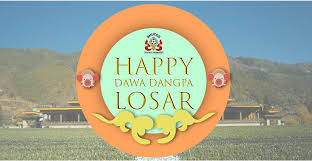
Dawa Dangpa Losar (ཟླ་ཝ་དང་པ་ལོ་གསར) is falls in February month every year. The word Losar literally means “new year”. It is derived from two Tibetan words, “lo” meaning year and “sar” meaning new.
The origin of Dawa Dangpa Losar can be taken back even before the Buddhism religion was established in Tibet. In early Bon tradition, a spiritual custom was held in the winter season. They burned incense in large quantities to please the local spirits, deities and protectors. Eventually with the arrival of Buddhism in Tibet, the older ceremony of Bon was incorporated into the Buddhist tradition, thereby becoming the Buddhist Losar festival. The Tibetans mark this occasion to get free of the bad evil spirits from their homes and lives that are lurking around and enter the new year of happiness and prosperity. It is also said that this New Year originated in Mongolia, in the 11th century, after the unification of the Mongols, better known as Hor, in Tibetan history. In Tibet, The Lunar New Year is also called the Gyalpoi Losar, to commemorate the conquest by a Mongolian King. It is also called Bal Gyal Lo. Bal is Tibet, Gyal is King, and Lo is year. Dawa Dangpa Losar begins the first month on the Tibetan calendar. It is called Gyalpo Losar in Tibet, which means “King’s New Year”. However, the origin of the losar was first celebrated in Tibet. As New Year falls on the first lunar month, it was later adopted to this day as a Losar in Tibet.
This New Year is largely observed throughout Bhutan, where it also referred to as Dawa Dangpa Losar, or New Year of the Bhutan. The establishment of the Dawa Dangpa Losar (New year) has close connections with the use of the Tibetan calendar. The Bhutanese calendar was aligned with the Tibetan calendar, which is the beginning of the first month according to the calculation based on which day is considered the New Year. In Bhutan, the Dawa Dangpa Losar became popular only after 1960s under the influence of many Tibetans, who came to Bhutan during China’s cultural revolution in late 1950s. In Bhutan, it is two days national holiday to celebrate the Dawa Dangpa Losar. It usually falls when the new harvest season cycle begins or when winter season is completed. In rural area, people get up every early on the New Year’s Day, take a bath, dress in new clothes, and make some offerings on the household shrines to start the family praying ceremony. It is a very important annual event for families and the community, giving everyone the chance to come together to enjoy one another’s company, play traditional games and sports such as archery and Khuru and also enjoy delicious foods and drinks. Some are dress up in new clothes and go to the monasteries to offer prayers.